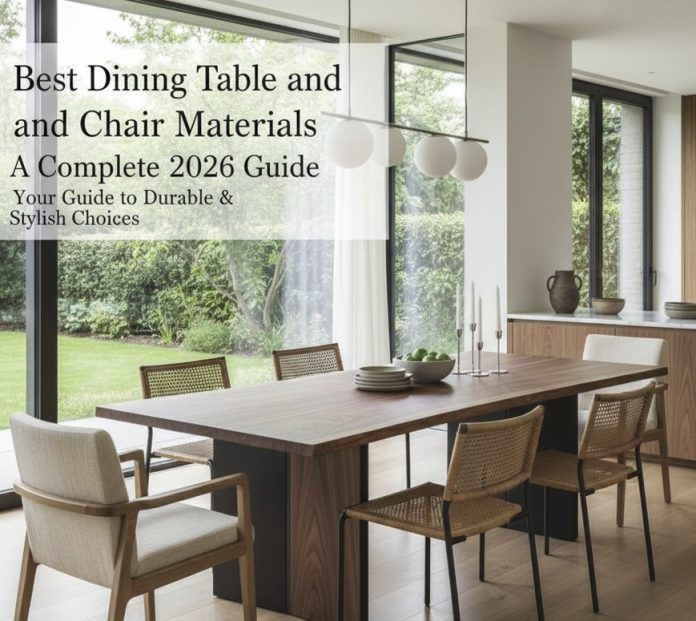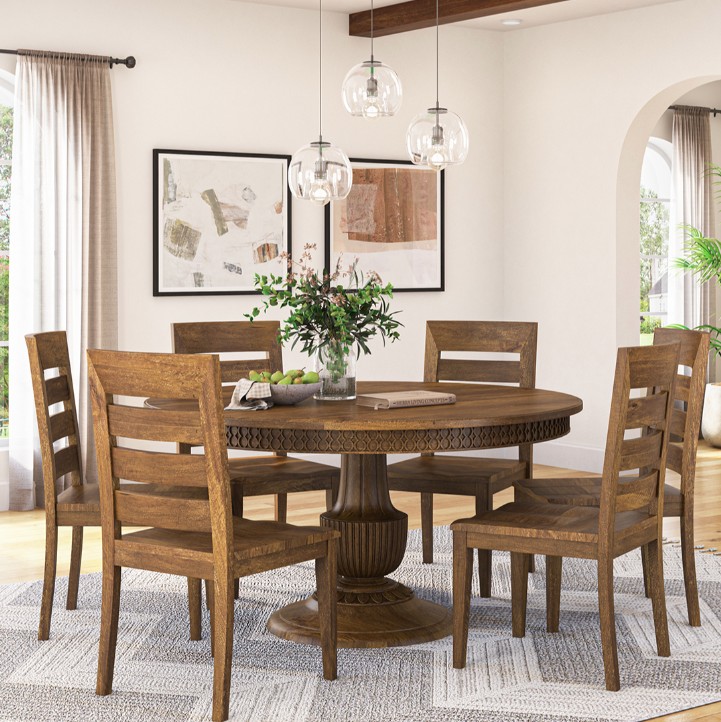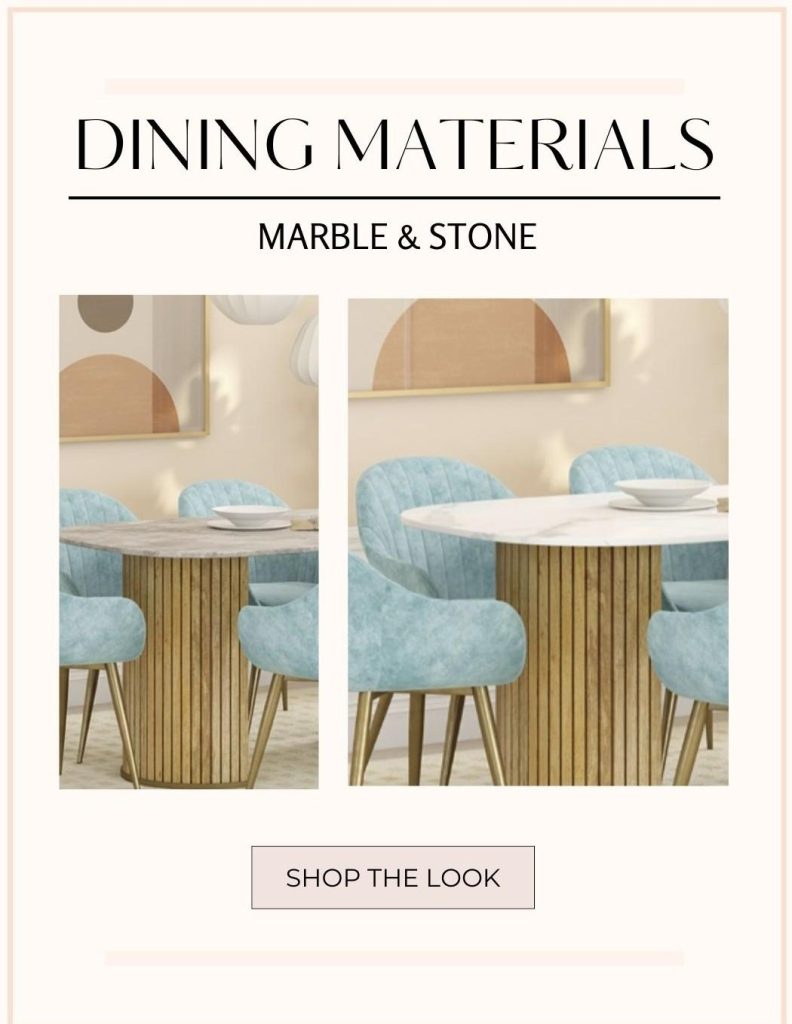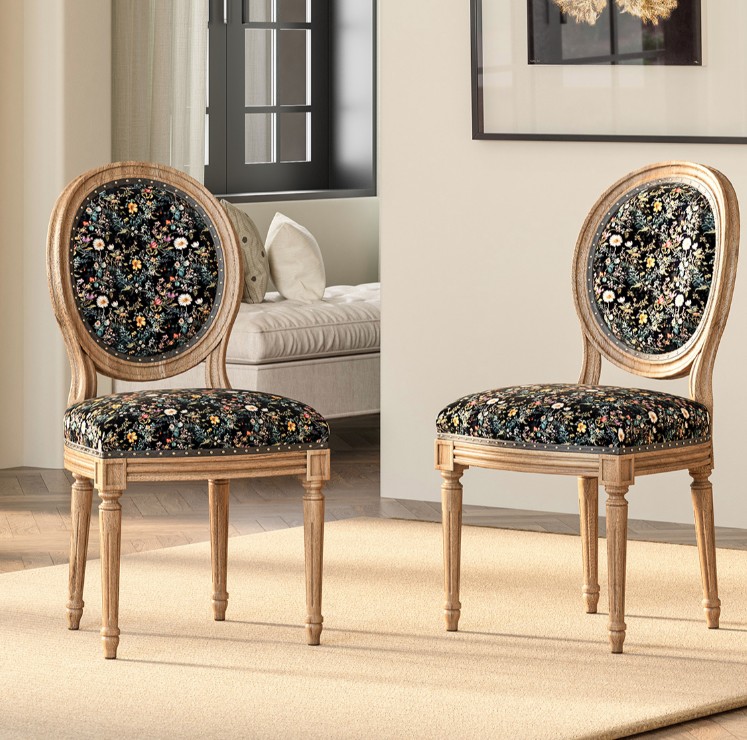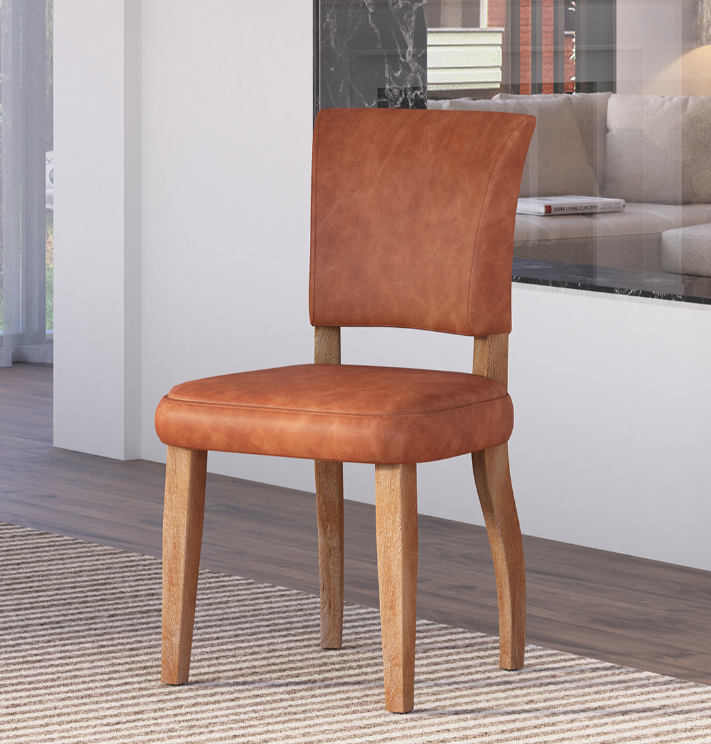Best Dining Table and Chair Materials – A Complete 2026 Guide
Last Updated on December 4, 2025 by SierraLivingConcepts
When it comes to choosing the best dining table and chair materials, today’s possibilities are more interesting than ever. Indeed, each material adds its own unique personality, pros, and cons to your dining area, from classic solid wood frames to cutting-edge ceramic tops, upholstered chairs, and even environmentally friendly bamboo pedestals. However, the truth is that no one material is ideal for everyone; ultimately, it all depends on your design preferences, lifestyle, and budget.
I still remember when my cousin furnished her first apartment; in fact, she immediately fell head over heels for a sleek glass-top dining table paired with velvet fabric chairs. However, just a week later, she realized that every single fingerprint showed on the table, and moreover, the chairs didn’t stand a chance against her toddler’s food spills.
On the other hand, my parents continue to cherish their solid wood table and sturdy wooden chairs, which, remarkably, are already fifteen years old. Even though their polish has faded and although they now carry scratches, those very marks nevertheless reveal tales of birthday parties, family dinners, and endless board game nights.
Therefore, understanding the dining table and chair materials together is so important before making a choice. After all, your dining set is not only a place to eat but also a fusion of everyday life and design; furthermore, it reflects comfort, durability, and lasting memories.
Why Materials Matter in 2026 Dining Spaces
More than just pieces of furniture, your dining table and chairs serve as the focal point for parties, late-night chats, and shared meals. In addition, the material you select has a direct impact on:
- Durability – For instance, if you’ve got little ones running around, a scratch-resistant table and stain-proof chair fabric can be a real lifesaver.
- Practicality – On the other hand, city residents often prefer lightweight, foldable, and easy-to-maneuver alternatives.
- Design & Style – Meanwhile, fashionistas might gravitate toward high-end finishes such as marble, boucle fabric, or sculptural metal frames.
- Sustainability – Finally, environmentally aware consumers are more likely to lean toward bamboo, reclaimed wood, or sustainably sourced upholstery.
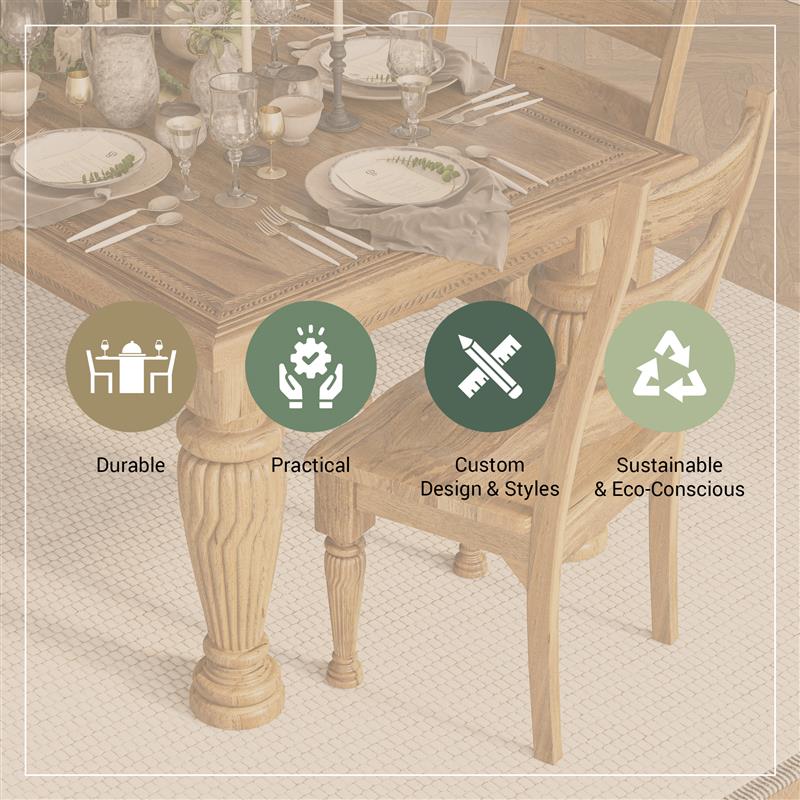
In short: The right material not only balances comfort, strength, style, and upkeep but also plays a key role in the overall dining experience. Moreover, this balance is evolving faster than ever in 2026, as, consequently, new trends and smarter material innovations continue to reshape how we dine.
Best Dining Table Materials for 2026 (With Pros & Cons)
1. Solid Wood Dining Tables (Oak, Walnut, Mango, Acacia)
- Best for: Timeless durability and natural charm.
- Pros: Long-lasting, can be refinished, warm, natural look.
- Cons: Heavy, more expensive, can scratch.
A solid wood dining table is like a leather jacket of furniture – it never goes out of style. Oak and walnut are rich, acacia provides a rustic touch, and mango wood is affordable and sustainable. If you’re the kind of person who would like your table to last decades (and perhaps even pass it down), then solid wood is absolutely every cent worth.
Example: A friend of mine has an oak dining table that has been in her family for 20 years. Remarkably, it looks brand new after she refinished it once, and this clearly proves why solid wood is still the king of dining table materials.
2. Engineered Wood Dining Tables
- Best for: Budget-friendly style seekers.
- Pros: Affordable, lighter than solid wood, eco-efficient.
- Cons: Less durable, can peel/wrap over time.
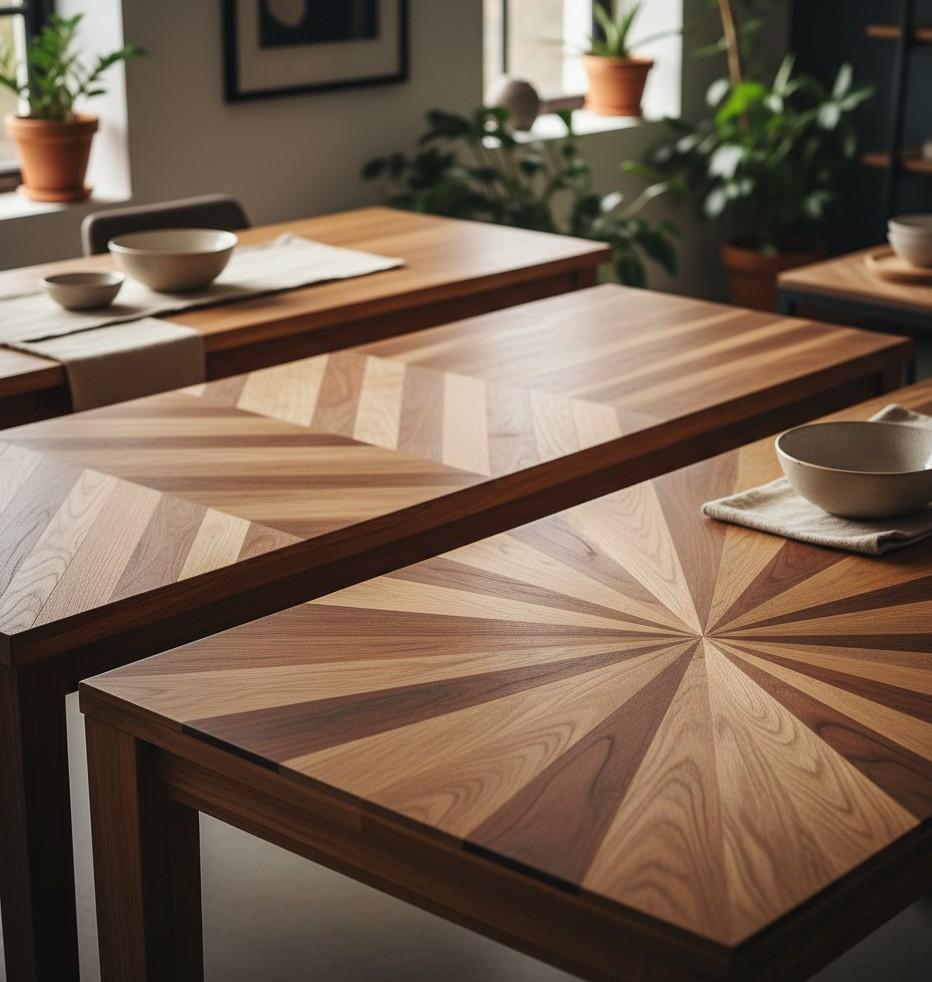
Materials like engineered wood, for instance, MDF or plywood with veneer finishes, give the look of solid wood without the price tag. In addition, it’s an excellent choice for first-time homeowners or renters on a tight budget. However, keep in mind that it will not age as gracefully as solid wood.
3. Glass Top Dining Tables
- Best for: Modern and small spaces.
- Pros: Sleek, makes rooms look bigger, easy to wipe clean.
- Cons: Shows fingerprints, risk of chipping.
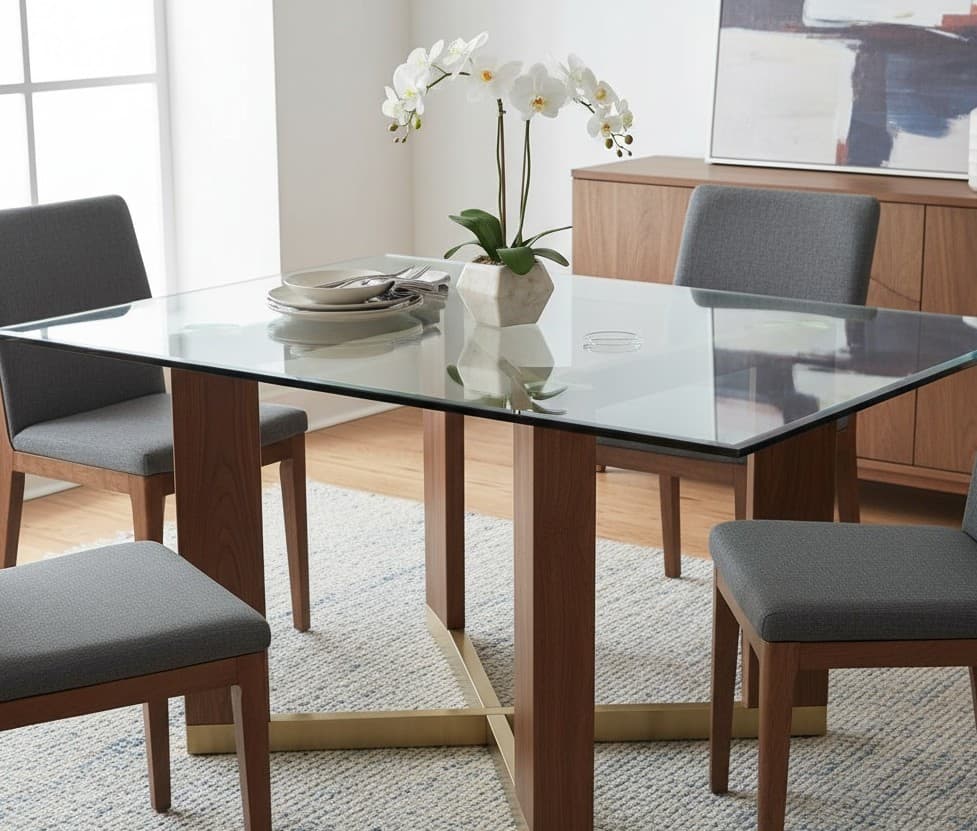
Glass dining tables are especially popular in city apartments, particularly those made of tempered glass. In fact, they provide an illusion of space by reflecting light, and they also make rooms feel brighter. Additionally, pairing them with metal or wood bases instantly adds personality and contrast.
But here’s the catch: My cousin’s glass table? Gorgeous at first. But she constantly wiped it after every meal. If you’re a neat freak, it might work. If not, maybe skip it.
4. Marble & Stone Dining Tables
- Best for: Luxury and statement dining rooms.
- Pros: Stunning, unique patterns, heat-resistant.
- Cons: Heavy, high maintenance, stains easily.
A marble & stone dining table instantly screams luxury, and therefore, it is the kind of piece that makes guests say “wow.” However, while it creates a striking impression, you must also be prepared for upkeep – sealing is necessary, and even then, red wine spills can still leave a mark.
Trend Fact: Marble and quartz tables will continue to remain popular in luxury design until 2026. Moreover, they will increasingly be paired with contrasting soft chairs, such as velvet or performance fabric, so that their boldness feels balanced and inviting.
5. Metal & Industrial Dining Tables (Steel, Aluminium, Wrought Iron)
- Best for: Urban-modern and loft-style interiors.
- Pros: Sturdy, elegant, and adaptable.
- Cons: Can scratch, may feel cold or harsh.
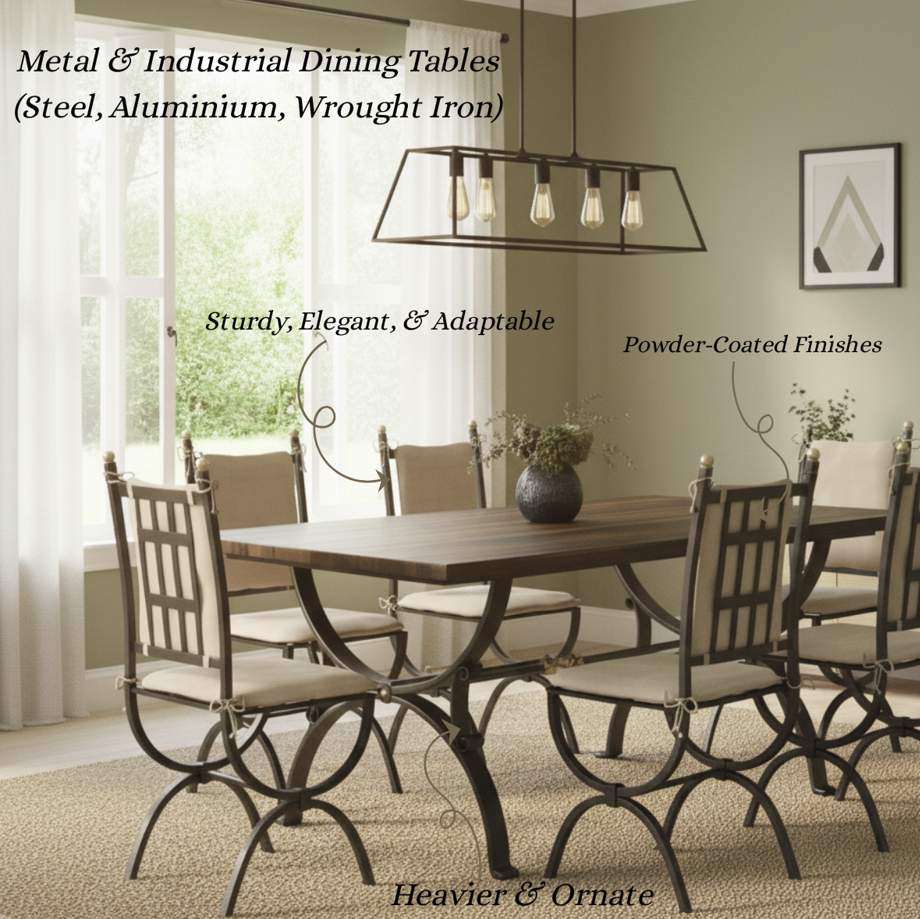
Not all metals are equal:
- Steel: Strong, sleek, built for decades.
- Aluminum: Lightweight, rust-resistant, great for moving around.
- Wrought Iron: Heavier, ornate, perfect for rustic or farmhouse charm.
Pair these with wood tops or glass surfaces for a striking balance of strength and style.
Metal bases paired with wood or glass tops are trending for 2026. They offer industrial vibes but also durability. Powder-coated finishes help reduce scratches and rust.
6. Concrete Dining Tables
- Best for: Minimalists and indoor-outdoor use.
- Pros: Extremely durable, weather-friendly, bold statement.
- Cons: Very heavy, can stain without sealing.

Concrete dining tables are a hot pick for those who love industrial minimalism. They work indoors and outdoors, and paired with warm chairs, they soften beautifully.
7. Ceramic & Porcelain Tops
- Best for: Low-maintenance families.
- Pros: Scratch-resistant, stain-proof, heat-resistant.
- Cons: Can be pricey, cold aesthetic.
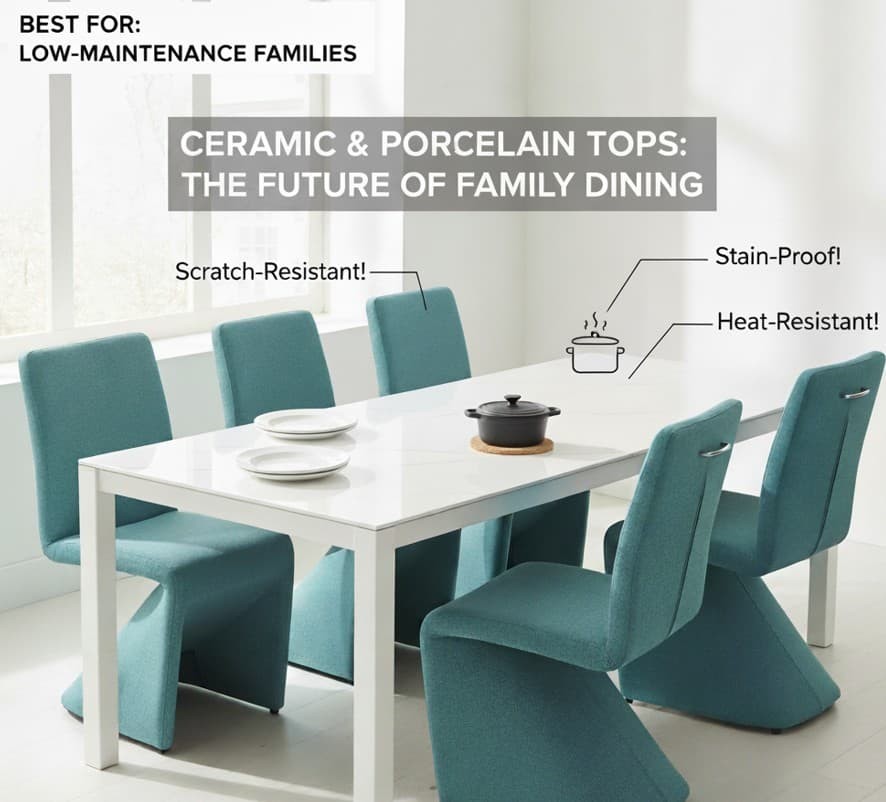
These are futuristic choices in 2026. Imagine a surface where spaghetti sauce, hot pans, and crayons don’t leave a mark – that’s ceramic. Families with kids will love this.
8. Sustainable Materials (Bamboo, Reclaimed Wood)
- Best for: Eco-conscious buyers.
- Pros: Renewable, stylish, eco-friendly.
- Cons: Can dent, limited styles compared to hardwood.
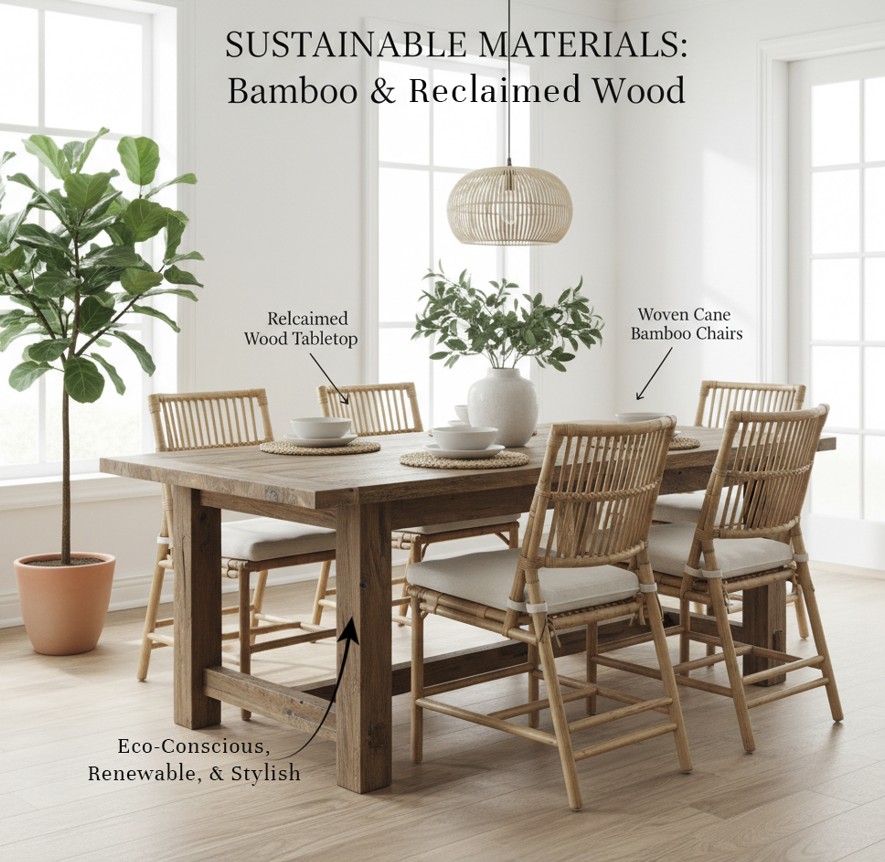
Bamboo and salvaged wood dining tables are popular in 2026, as sustainability drives furniture trends. In addition to being fashionable, they also minimize their environmental impact.
9. Softwood Dining Tables (Pine, Spruce)
- Best for: Budget-friendly traditionalists.
- Pros: Lightweight, easy to move, affordable, and warm with a rustic charm.
- Cons: Softer surface scratches easily, less durable than hardwood.

Softwood material dining tables, like pine and spruce, remain favorites for farmhouse or cottage-style interiors. They are generally more wallet-friendly than hardwoods, which makes them ideal as starter tables; however, they may show signs of wear sooner.
10. Plastic & Laminate Dining Tables
- Best for: Families, casual spaces, kids’ rooms.
- Pros: Affordable, lightweight, easy to clean, comes in many finishes.
- Cons: Less durable, can look less premium.

Think of laminate and melamine as the “everyday hero material” of dining tables. They are perfect if spaghetti spills, crayon marks, or juice boxes are a daily affair. They don’t need pampering and often mimic pricier wood or stone finishes.
Best Dining Chair Materials for 2026
Of course, the dining table is not the whole story – chairs matter too. In fact, the right dining chair materials not only determine how comfortable your dinners feel but also influence how easy cleanup will be and, consequently, how long your chairs will last.
For 2026, dining chair trends are leaning towards comfort, sustainability, and creative material pairings. Let’s break down the best options:
1. Solid Wood Dining Chairs – Classic & Enduring
If you want chairs that age gracefully, solid wood dining chairs are unbeatable. Oak and walnut bring timeless richness, mango wood adds rustic warmth, and acacia provides affordability without sacrificing durability.
These dining chairs are sturdy, ergonomic, and versatile across styles – from farmhouse dining tables to modern minimalist spaces
- Best for: Families who want longevity and a classic look.
- Pair with: Wooden or marble tables for a balanced aesthetic.
2. Upholstered Dining Chairs – Comfort Meets Luxury
In 2026, upholstered dining chairs are bigger than ever. To begin with, fabrics like velvet and high-performance textiles not only add comfort but also bring elegance to any space. In addition, performance fabrics are stain-resistant and therefore perfect for families with kids. Furthermore, velvet remains a timeless favorite for luxe dining rooms, especially when paired with glass or marble tables. As a result, homeowners can now enjoy both practicality and sophistication without compromise.
- Best for: Long dinners, entertaining guests, comfort lovers.
- Pair with: Marble, glass, or wood tables for a touch of luxury.
3. Natural Fabrics (Velvet, Cotton & Linen Blends)
- Best for: Breezy, casual dining spaces.
- Pros: Breathable, soft, natural aesthetic.
- Cons: Wrinkle easily, absorb stains.
Whether it’s the relaxed charm of cotton or linen blends or the luxurious touch of velvet dining chairs, natural fabrics bring warmth and personality. They age with character, making them ideal if you appreciate a lived-in, cosy aesthetic, though fabric protection sprays are highly recommended.
4. Performance Fabrics (Polyester, Microfiber, Crypton)
- Best for: Busy families, entertainers, and pet owners.
- Pros: Stain-resistant, durable, easy to maintain.
- Cons: Can feel less “luxurious” than natural fibers.

If spaghetti nights and red wine spills are a regular occurrence, these fabrics are lifesavers. Crypton in particular resists stains, odors, and even microbes, making it the gold standard for family dining chairs in 2026.
5. Plastic & Molded Dining Chairs
- Best for: Compact homes, budget-conscious buyers.
- Pros: Stackable, lightweight, easy to clean, inexpensive.
- Cons: Less premium, not as durable as wood/metal.

Polypropylene and molded plastic chairs have become design icons in modern homes. They are colorful, playful, and great for renters, balconies, or small dining spaces where flexibility is key.
6. Leather & Faux Leather Dining Chairs – Sleek & Practical
Leather and faux leather dining chairs strike a balance between sophistication and easy upkeep. Real leather ages beautifully with patina, while faux leather is affordable and low maintenance. They are easy to wipe clean after spills, making them family-friendly while still maintaining a chic aesthetic.
- Best for: Busy families or anyone who wants style without high upkeep.
- Pair with: Wood or concrete tables for a modern-meets-rustic vibe.
7. Metal Dining Chairs – Industrial Strength
If you love industrial or modern dining rooms, metal chairs are a natural fit. They are incredibly sturdy, often stackable, and come in powder-coated finishes that resist rust and scratches. The downside? They can feel cold, so adding cushions or pairing them with wood or upholstered tables softens the look.

- Best for: Lofts, apartments, and contemporary dining spaces.
- Pair with: Glass, wood, or concrete tables for an urban-industrial style.
8. Rattan, Wicker, & Cane Dining Chairs – Airy & Eco-Trendy
Rattan, wicker, and cane material dining chairs continue their rise in 2026 as part of the boho-modern and eco-friendly trend. They are lightweight, breathable, and bring natural warmth to dining spaces. Although they may not be as sturdy as wood or metal, their aesthetic charm still makes them highly popular, especially in modern, coastal, and farmhouse homes.
- Best for: Casual dining rooms, eco-conscious buyers, or sunlit spaces.
- Pair with: Reclaimed wood or marble tables for contrast.
9. Acrylic & Transparent Dining Chairs – Futuristic & Space-Saving
Perfect for small apartments, acrylic and polycarbonate chairs create the illusion of space. Their transparent design adds a futuristic touch and allows bold tables (like marble or wood) to stand out. They are surprisingly durable, but scratches can show over time.

- Best for: Compact homes, modern interiors, or anyone who loves sleek design.
- Pair with: Glass or metal tables for a contemporary statement.
10. Hybrid Dining Chairs – The Best of Both Worlds
One of the hottest 2026 trends is hybrid dining chair design – mixing materials like wood + cane or metal upholstery. These dining chair materials combine durability with comfort and bring in layered textures that feel fresh and modern. Hybrid styles are also a great way to blend different design elements into a single dining table and chair set.
- Best for: Design-forward homes that embrace contrast.
- Pair with: Almost any table material, depending on the combination.
Quick Comparison Chart for Beginners
Here’s a quick snapshot of how the most popular dining table & chair materials compare:
For Dining Table:
| Material | Durability | Maintenance | Cost Range | Style | Best For |
| Solid Wood (Oak, Walnut, Mango, Acacia) | High – can last decades | Needs refinishing/polishing | $1,500 – $4,000+ | Timeless, rustic, versatile | Large Family & Heirloom-quality buyers |
| Engineered Wood (MDF, Veneer, Plywood) | Moderate – not as strong as solid wood | Easy, but can peel/warp | $200 – $1,000 | Wood-look, modern casual | Plastic/Laminate |
| Softwoods (Pine, Spruce) | Lower – scratches easily | Easy upkeep | $250 – $2,000 | Light, farmhouse, casual | Seasonal use, budget shoppers |
| Glass | Moderate – tempered is stronger | Frequent cleaning | $400 – $3,500 | Modern, airy, sleek | Small apartments, style-focused buyers |
| Marble/Stone | Very high but stains easily | Needs sealing & care | $1500 – $7,000 | Luxury, bold, statement | Luxe homes, entertainers |
| Metal (Steel, Aluminum, Wrought Iron) | Very durable | Low maintenance | $500 – $2,500 | Industrial, urban, modern | Lofts, contemporary interiors |
| Concrete | Extremely durable | Needs sealing to prevent stains | $1,000 – $3,500 | Minimalist, industrial | Indoor-outdoor spaces, bold looks |
| Ceramic/Porcelain | High – scratch & stain resistant | Very low upkeep | $1,200 – $4,000 | Futuristic, sleek | Families, kid-proof dining |
| Bamboo/Reclaimed Wood | Moderate to high | Needs care against dents | $500 – $1,800 | Eco-friendly, rustic | Eco-conscious buyers |
| Plastic/Laminate | Moderate – kid-friendly | Easy wipe clean | $100 – $700 | Casual, colorful, playful | Families with kids, budget buyers |
For Dining Chairs:
| Material | Durability | Maintenance | Cost Range (Per Chair) | Style | Best For |
| Solid Wood (Oak, Walnut, Mango, Acacia) | High – sturdy & long-lasting | Occasional polishing | $200 – $400 | Classic, traditional, rustic | Families, long-term durability |
| Upholstered (Velvet, Linen, Bouclé) | Moderate – depends on fabric | Needs vaccuming, stain care | $250 – $600 | Luxurious, cozy, formal | Entertainers, comfort lovers |
| Natural Fabrics (Cotton/Linen blends) | Moderate | Washable/slipcovers help | $120 – $400 | Casual, farmhouse, breathable | Everyday use, light styles |
| Performance Fabrics (Polyester, Microfiber, Crypton) | Highly Durable – stain & spill resistant | Easy to clean, family-friendly | $150 – $500 | Practical, modern | Families with kids or pets |
| Leather | Highly Durable – aged with patina | Needs conditioning | $250 – $800 | Sleek, elegant, timeless | Luxury homes, long-term durability |
| Faux Leather | Moderate – less durable | Wipe clean, low upkeep | $100 – $300 | Modern, casual | Budget buyers, busy households |
| Metal | Highly Durable – sturdy, often stackable | Minimal upkeep | $80 – $250 | Industrial, urban | Lofts, apartments, modern dining |
| Rattan, Wicker, Cane | Moderate – lighter build | Needs dusting, avoid moisture | $120 – $400 | Boho, coastal, airy | Sunrooms, eco-conscious home |
| Acrylic / Transparent | Moderate – can scratch | Wipe clean | $100 – $350 | Futuristic, space-saving | Compact homes, modern interiors |
| Plastic / Molded | Moderate – very practical | Easy wipe clean | $60 – $200 | Contemporary, casual | Budget buyers, stackable needs |
| Hybrid (Wood + Cane, Metal + Wood + Upholstery) | High – depends on mix | Moderate | $150 – $600 | Trendy, layered, versatile | Design-forward, eclectic homes |
Matching Dining Table & Chair Materials Trends 2026
Gone are the days when your dining table and chairs had to look like they came straight out of the same set. Today, and especially moving into 2026, designers and homeowners will embrace contrast, texture, and individuality in dining setups. Think of it like curating an outfit – after all, you don’t need to match every piece of clothing, but it should still look intentional and stylish.
Here’s what’s trending:
#Mix & Match Freedom
Instead of buying “matching” dining sets, homeowners are now pairing different dining table and chair materials for a personalized look. For instance, a solid oak table might be softened with velvet upholstered dining chairs, while on the other hand, a sleek glass table pairs beautifully with metal frames and cushioned seats. Ultimately, this contrast not only creates depth but also avoids the “catalog showroom” feel.
#Hybrid Setups with Character
Designers predict more unexpected pairings in 2026. For example, a bold marble dining table may be offset with cane-back chairs to introduce warmth and breathability. Similarly, ceramic-top tables are often paired with faux leather chairs for both durability and modern style.
#Comfort Takes Center Stage
Families and entertainers are prioritizing ergonomics and upholstery. Expect to see more performance fabrics (stain-resistant, spill-proof, kid-friendly) and ergonomic backrests that make lingering at the dining table more enjoyable. Even in luxury setups, dining chairs are becoming cozier rather than just decorative.
#Smart Finishes & Coatings
Both dining tables and chairs are now available with anti-scratch, antibacterial, and water-resistant finishes. These “smart” innovations aren’t just for high-end pieces – many mid-range dining sets in 2026 are adopting them. Imagine upholstered chairs that repel wine spills or wooden tables that resist heat marks from hot pans.
Pro Tip: If you are mixing and matching, first pick one unifying element – color, finish, or texture – that ties the table and chairs together. For example, a walnut dining table with black metal legs can, in turn, feel cohesive with black metal-framed dining chairs, even if the seat material is upholstered.

Factors to Consider When Choosing Dining Table and Chair Materials (2026 Edition)
Choosing the right dining table and chair materials is not just about looks – it is about how you live. Here’s what to weigh before buying:
Durability vs. Lifestyle Needs
- Families with kids or pets: Go for scratch-resistant surfaces like ceramic or sealed solid wood.
- Singles or couples without kids: You can prioritize design-forward options like glass or marble.
- Frequent entertainers: Choose materials like quartz, engineered stone, or performance upholstery that can withstand spills and heavy use.
Maintenance Requirements
- Hate cleaning? Skip high-maintenance picks like glass (fingerprints) or marble (stains).
- Prefer “set it and forget it”? Ceramic, porcelain, and engineered wood with protective coatings are your best friends.
Budget Considerations
- Budget-friendly: Engineered wood, MDF, veneer, and plastic/acrylic.
- Mid-range: Solid mango wood, tempered glass, rattan chairs.
- Luxury picks: Marble, quartz, walnut, velvet, or leather upholstery.
Eco-friendliness
In 2026, sustainability is not just a buzzword – it is a top buying factor. Look for:
- FSC-certified wood.
- Reclaimed or recycled materials.
- Bamboo tables (fast-growing and renewable).
- Eco-friendly fabrics for upholstery.
Style & Aesthetics
- Farmhouse lovers: Rustic solid wood, reclaimed wood, and linen chairs.
- Modern minimalists: Glass, metal, concrete
- Industrial fans: Metal, exposed concrete, wood with steel bases.
- Luxe homes: Marble, velvet, brass accents.
Quick Tip: Before shopping, make a checklist: How many people will use it daily? Do I want low-maintenance or luxurious? What style is my home? Answering these upfront prevents buyer’s remorse.

2026 Dining Trends Shaping Material Choices
The dining furniture market in 2026 is being shaped by practicality, sustainability, and technology without compromising style. Here’s what’s leading the way:
- Sustainability First
Expect more reclaimed wood, bamboo, and eco-certified options on the market. In fact, many furniture retailers now highlight their carbon footprint and sourcing transparency, which buyers actively check before purchase.
- Smart Finishes Are Mainstream
What was once a luxury (heat-proof, antibacterial, water-resistant coatings) is now becoming standard even for mid-range dining tables. Parents especially love this trend – no more panicking over permanent juice stains.
- Hybrid Materials = Fresh Aesthetics
Blending materials is hot in 2026. Picture wood + cane chairs, marble + metal tables, or glass tops with rattan accents. These hybrid dining table and chair materials not only look unique but also make furniture adaptable to multiple interior styles.
- Luxury Boom Continues
Marble and quartz remain aspirational, paired with high-end fabrics like velvet or performance leather. These combos are dominating premium dining spaces in 2026, especially as buyers view dining sets as investment pieces.
- Compact & Modular Living
With urban apartments shrinking, extendable, foldable, and modular dining tables are surging. Think expandable wooden tables with hidden leaves or stackable acrylic chairs that save space.
- Tech-Friendly Dining
As homes get smarter, so do dining sets. We’re seeing tables with built-in charging ports, wireless charging pads, and even integrated LED lighting to set the mood.

Care & Maintenance Tips by Material
Your dining furniture can last decades if you maintain it properly. Here’s a quick reference guide:
- Wood: Oil every 6-12 months, avoid direct sunlight and water rings (use coasters).
- Glass: Clean with microfiber cloths and avoid abrasive sponges to prevent scratches.
- Marble/Stone: Seal annually, clean spills immediately, and avoid acidic cleaners (lemon/vinegar).
- Upholstery: Vacuum weekly, use fabric protector, and blot – not rub – spills.
- Metal: Apply rust-protective sprays and avoid harsh chemicals.
- Leather: Use eco-friendly leather conditioners to prevent cracking.
Insider Tip: A customer once told me that, for example, they cover their wooden table with a transparent acrylic sheet during kids’ birthday parties. This way, it not only saves the wood surface from scratches and stains but also keeps the table visible.
Conclusion
In the coming 2026, dining table and chair materials won’t just be about what looks good – they’re also about creating spaces that feel alive, functional, and truly yours. For instance, whether it’s a reclaimed wood table paired with velvet chairs, a marble top styled with cane, or a solid wood classic built to last for generations, the choices are practically endless. Moreover, the secret lies in picking materials that match your lifestyle, your vibe, and the way you love to gather.
If you’re dreaming of premium handcrafted solid wood dining tables, custom chairs, and other perfect pairings – such as buffet & sideboard cabinets, bar carts, buffet with hutch, kitchen island table & carts, then Sierra Living Concepts is here to bring artistry and durability together in every piece. Furthermore, by exploring our curated collection, you can find pieces that seamlessly combine elegance with everyday functionality. So, why wait? Browse our premium solid wood selection today and bring home the dining set that truly tells your story.


